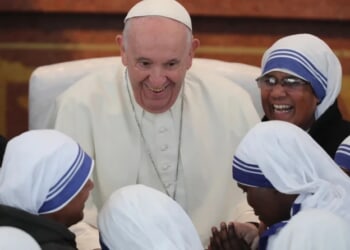Damien Moore is a senior advisor at Fullbrook Strategies and the former Conservative MP for Southport.
Last week, our nation stood together to mark 80 years since VE Day. At the heart of those commemorations were our veterans, men and women who risked, and often gave, their lives in defence of our freedoms, standing firm against fascism, terrorism, and separatism in Europe.
Among them is Bernard Morgan, the last surviving RAF codebreaker from D-Day, who landed in Normandy aged just 20. Now 100, Bernard speaks not of glory, but of duty. These were ordinary people who did extraordinary things. Thanks to generations of servicemen and women who have served our nation, often in the most hostile conditions, we enjoy our freedoms, liberties, and security.
Yet today, the same country that honours their memory is turning its back on those who served in Northern Ireland during Operation Banner. It is a shameful contradiction; applauded one week, prosecuted the next.
These veterans, like their forebears, answered the call of duty, and yet they now live with the constant threat of prosecution, decades after their service, often for actions taken under orders, in the fog of conflict, with decisions made in split seconds.
Now, the Government is proposing to repeal the Northern Ireland Troubles (Legacy and Reconciliation) Act 2023. This is legislation introduced to shield our veterans from politically motivated prosecutions by granting conditional immunity in legacy cases.
Why? Because it’s supposedly incompatible with rulings from the European Court of Human Rights. Yes, that’s right, the same foreign court that routinely blocks us from deporting dangerous foreign criminals – and now wants to open the door to prosecuting British soldiers who served under Operation Banner.
Operation Banner, the British Armed Forces’ deployment in Northern Ireland from 1969 to 2007, remains one of the longest continuous military operations in British history. Our soldiers operated in an environment of civil unrest, sectarian violence, and terrorism. They were not occupiers; they were protectors.
More than 1,400 soldiers lost their lives. Thousands more bear the physical and psychological scars of that conflict. Now, in their final years, they face being dragged through the courts – not because of new evidence, but often because of political pressure.
While all credible allegations must be examined, the blanket removal of immunity provisions is not justice, it is persecution by another name. This undermines the principle of proportionality, and puts ageing veterans through renewed trauma long after original inquiries found no grounds for further action.
We may find ourselves in a situation where IRA operatives receive letters of comfort and early release, while British soldiers face endless investigation and the possibility of imprisonment. It’s a disgrace.
Such decisions undermine the Armed Forces Covenant, the moral and legal compact that assures service personnel they will be supported, not punished, for actions carried out in good faith under lawful orders. If that assurance is eroded, recruitment, morale, and operational effectiveness will all suffer.
How can we ask today’s soldiers to defend this country if they know that, decades from now, they could be prosecuted for carrying out their duties under the orders of their government? Repealing this piece of legislation places our veterans at risk, threatens national security, and damages public confidence in the government’s commitment to those who serve.
Last week, we looked to our WWII veterans to remind ourselves what resilience, duty, and sacrifice mean. But it is not enough to admire their legacy, we must uphold their values.
That means defending those who defended us. We must not leave our soldiers behind. Not in Northern Ireland. Not in the courts. Not in history.
I urge the Government to reject any external interference, honour our covenant with the armed forces, and reaffirm its commitment to those who protected the United Kingdom.
Meanwhile, please sign the petition to Protect Northern Ireland Veterans from Prosecutions, and that it is debated in Parliament. Let’s stand together for justice, for our veterans, and for the country they fought to defend.



![‘It’s a Recipe for a Hundred Years of National Dominance’: Stephen Miller [WATCH]](https://www.right2024.com/wp-content/uploads/2025/05/Stephen-Miller-Completely-Obliterates-CNN-Host-Over-Her-Illegal-Immigration-350x250.jpg)

![Trump Posts Hilarious Pope Meme, Leftists Immediately Melt Down [WATCH]](https://www.right2024.com/wp-content/uploads/2025/05/Trump-Posts-Hilarious-Pope-Meme-Leftists-Immediately-Melt-Down-WATCH-350x250.jpg)

![Wild Road Rage Brawl Erupts in Milwaukee [WATCH]](https://www.right2024.com/wp-content/uploads/2025/05/Road-Rage-Turns-Violent-in-Oregon-Minivan-Mows-Down-Motorcyclist-350x250.jpg)


![Karoline Leavitt Calls for Jill Biden to Answer for Joe's Cognitive Decline Cover-Up [WATCH]](https://www.right2024.com/wp-content/uploads/2025/05/Karoline-Leavitt-Calls-for-Jill-Biden-to-Answer-for-Joes-350x250.jpg)
![Bessent Exposes Media Lies About April’s Stock Market Performance [WATCH]](https://www.right2024.com/wp-content/uploads/2025/04/Bessent-Exposes-Media-Lies-About-Aprils-Stock-Market-Performance-WATCH-350x250.jpg)





